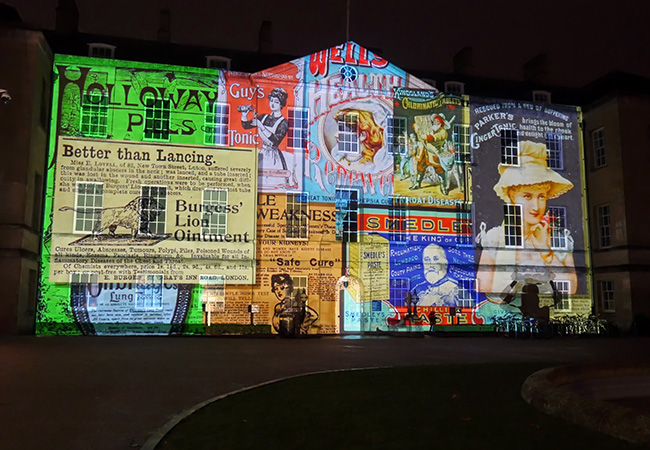
A multi-storey lightshow.
Disease, environmental pollution and mental health – challenges that were as real for people in the Victorian era as they are for us today – will be brought to life during a multi-storey lightshow at the University of Otago’s Dunedin campus next month.
Between 8:45pm and 10:30pm on 8 March, Oxford University Professor Sally Shuttleworth’s award-winning sound and light show ‘The Speed of Modern Life’ will light up Otago’s Richardson Building.
The projection – which showcases work from her European Research Council-funded project, ‘Diseases of Modern Life’ – shows how the Victorians grappled with a world in transition and the pressures they faced.
Otago English and Linguistics programme academic Dr Grace Moore says Professor Shuttleworth’s project will have broad appeal because many of these stressors are familiar to us today.
“In addition to its scale and visually stunning nature, the work draws parallels between the past and the present.”
The work is a collaboration with The Projection Studio artists, Ross Ashton and Karen Monid, who have worked on some of the most famous buildings in the world, including the English Houses of Parliament, and Buckingham Palace.
Professor Shuttleworth is renowned for her interdisciplinary work which brings together literary studies, psychology, medicine, the Environmental Humanities and the History of Science. She is a William Evans Visiting Fellow at the University of Otago between February and March 2020.
“We are really delighted to be able to host Sally Shuttleworth as a William Evans Fellow. Sally’s projection – which uses world-class projectionists to showcase her research – is a wonderful gift to the University and to the city as a whole. Given Dunedin’s strong Victorian roots, the projection speaks to the city’s nineteenth-century heritage, and it’s also quite literally a spectacular example of how academic work can be communicated clearly to broad audiences,” Dr Moore says.
“The event also makes an important statement about the value and centrality of the Humanities in everyday life.”







